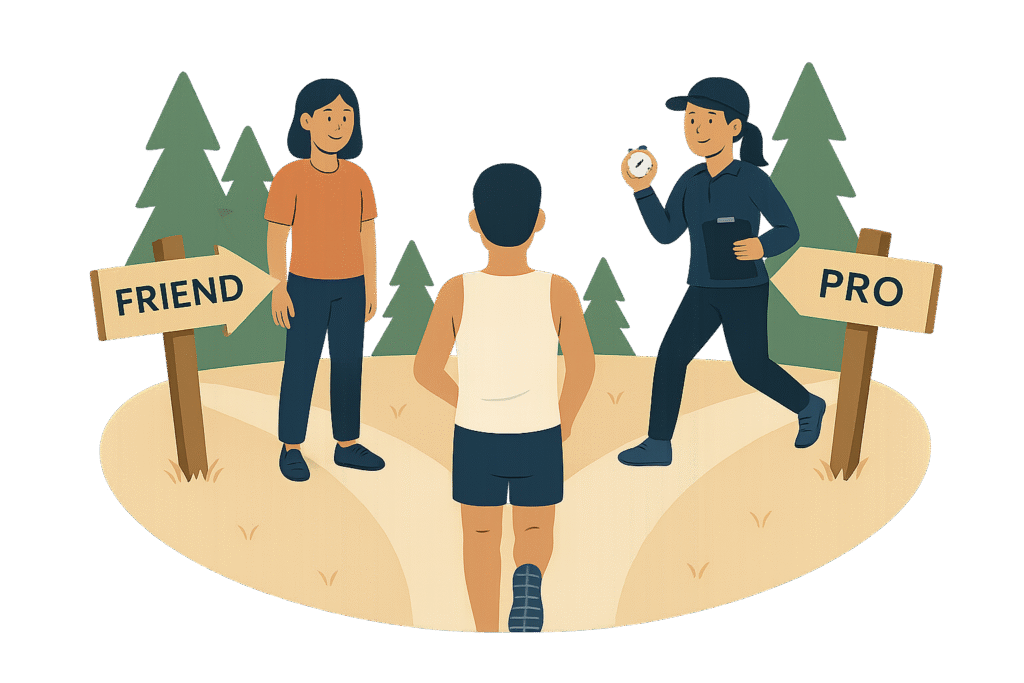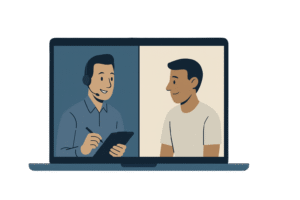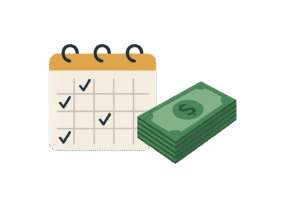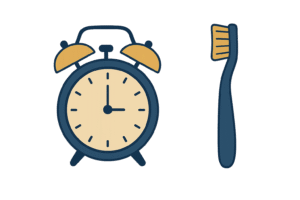Goals don’t quit on themselves; people do when no one important is watching. Pick the right accountability partner and procrastination evaporates. Choose the wrong one and your plans slip into “maybe next year.”
Imagine a first‑time marathoner. His upbeat neighbor says, “Text me if you miss a run.” A veteran coach meets him at dawn and clocks every mile. Same 26.2 miles, two wildly different outcomes. So which partner actually gets you across the finish line? And how do you spot them before mile one?
Comfort vs. Progress: What “Better” Really Means
When we ask, “Which accountability partner is better?”, we first have to define better. If “better” simply means “feels nicer”, the answer is simple: pick whoever lets you skip a workout with no guilt. But that isn’t an accountability partnership. It’s a comfort blanket.
What you’re really saying when you hunt for an accountability partner is this: I have targets I still haven’t hit, and my everyday actions aren’t closing the gap between where I am and where I want to be. That underlying need calls for structure, firm deadlines, and nudges that won’t always feel cozy.
An effective partner’s real job is to keep you moving until the results themselves deliver the real feel-good payoff. Along the way you might feel pressured or even annoyed. That discomfort is temporary. The pride of achievement sticks.
So who applies the right kind of pressure: someone who already knows your entire backstory, or a complete stranger?
- The best thing about someone close to you? They know you, and you know them.
- The worst thing about someone close to you? They know you, and you know them.
Let’s look at these two camps: familiar faces and external pros. What does each one bring to the table?
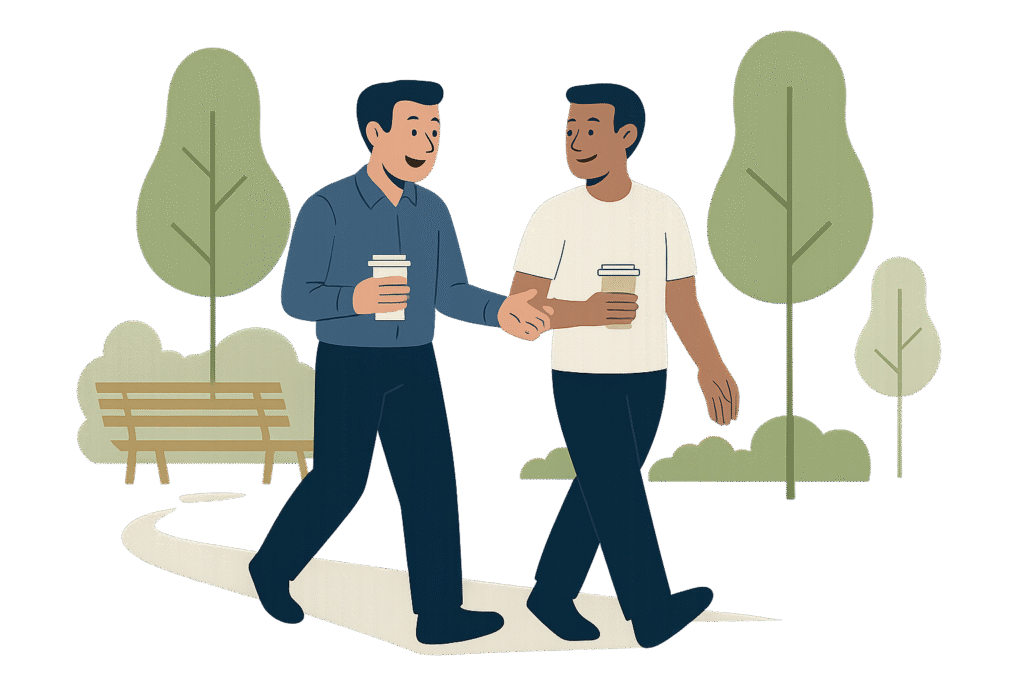
Familiar faces: When your accountability partner is someone you already know
Think someone already in your life: sibling, cousin, or close friend.
Pros
- Low or no cost. It’s usually free, or you swap favors. No invoices, no budget stress.
- Comfort and connection. They know your habits, history, and context, so you don’t need to explain your backstory.
- Flexibility. Plans can shift easily. If something comes up, you both understand and adjust without much fuss.
These sound like wins. But are they? It depends on your goal. If you’re after a pleasant, low-stakes experience, those pros hold up. But if what you really want is to finally follow through, especially when you don’t feel like it, each of those perks can quietly become a liability.
Cons
- Free cuts both ways. With no money on the table, commitment drops. You’re less likely to treat it seriously, and so are they.
- Too familiar to challenge. The very definition of friendship is to support, not confront. Calling you out goes against the idea of being a “good friend” and creates tensions, so they usually won’t.
- Comfort = less urgency. When you’ve known someone for years, you feel less need to “prove” anything. That means less drive to show up sharp or make progress visible.
- Flexible = flaky. The whole point of an accountability partner is to help you show up when you don’t feel like it. Rescheduling too easily takes the edge off the commitment.
- Blurry boundaries. It’s easy for check-ins to drift into weekend‑plans chatter. Focus fades.
And what does that all lead to?
- Uneven commitment. Your priorities might not match. What’s “urgent” to you may not matter to them.
- Soft feedback. They may avoid tough truths to protect the friendship.
- Low follow‑through. When one of you slacks off, it’s hard to challenge without things getting awkward.
- Stalled momentum. What starts with energy often fizzles. You both lose interest when progress is slow and no one is really keeping score.
Where do you find someone like this?
Just look around. If you’re new to accountability partnerships, starting with someone familiar isn’t a bad idea. Pick someone who’s either disciplined themselves or equally motivated to make a change. Make sure you’re both on the same page about expectations to further increase your chances of making it work long-term.
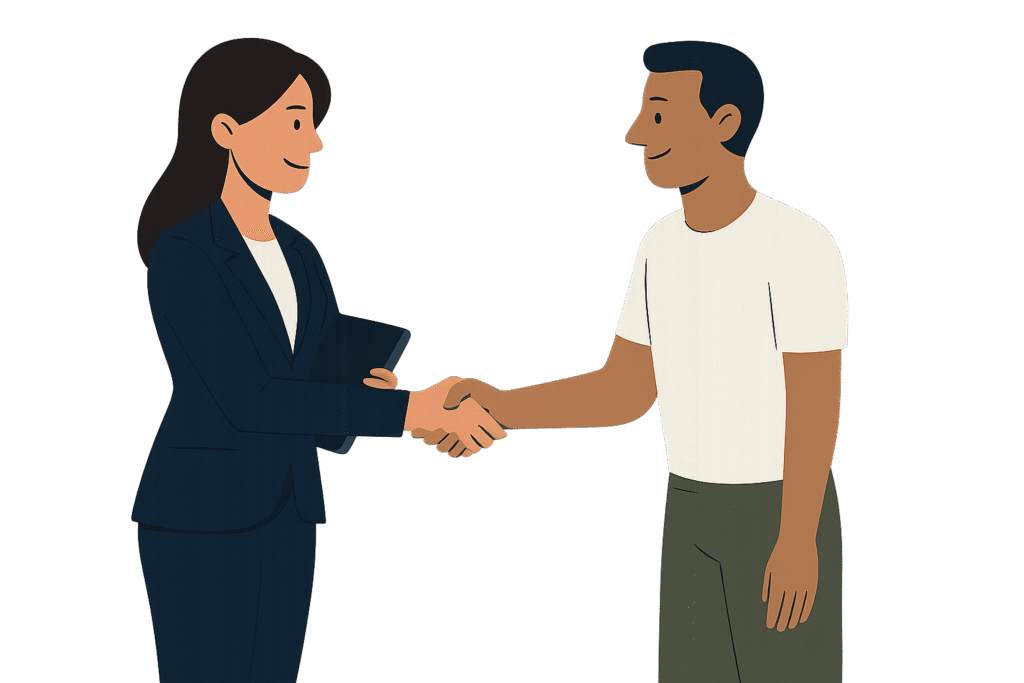
External partners: When your accountability partner is someone new
Here, we’re talking about strangers: people you haven’t worked with before, who come in with a clean slate.
Pros
- You pay, so you care. You commit, so stakes are real. Flaking costs something. You’re hiring someone to focus on you, they don’t expect the same from you in return. That clarity makes the setup far more stable long-term.
- Professional structure. Calls stay focused. No chit-chat, no distractions. These partners know how to set and run well-structured check-ins. You’re not “doing them a favor,” and they’re not just tagging along.
- Fresh perspective. They challenge your thinking and aren’t tied to your past habits.
Cons
- It costs. High-quality accountability isn’t free. But price only matters in context. Paying $100 means nothing if you finally build the habit that changes your life. It’s not about the number, but rather the return on it.
- Risk of mismatch. Not every partner clicks. The upside? You can switch without guilt or fallout. That flexibility protects your momentum without damaging personal ties.
- Takes time to sync. There’s a learning curve. You’ll need a few sessions to explain your context, working style, and what kind of pressure you actually respond to.
If you’re going hard after ambitious goals, it might even be smart to rotate partners over time. As you grow more familiar with someone, the push often softens. New faces bring renewed pressure, even if the switch feels uncomfortable. But that’s the point. Growth thrives in discomfort.
Just be mindful: not every new partner will be a perfect fit, so you’re trading stability for stretch.
Where do you find someone like this?
You’ve got two main routes: real life or online.
1. In real life:
Look for people who share your interests or activities: coworking space, gym, or writing group. Even if the partnership isn’t formally defined, shared ambition and a goal‑oriented environment can create powerful mutual accountability.
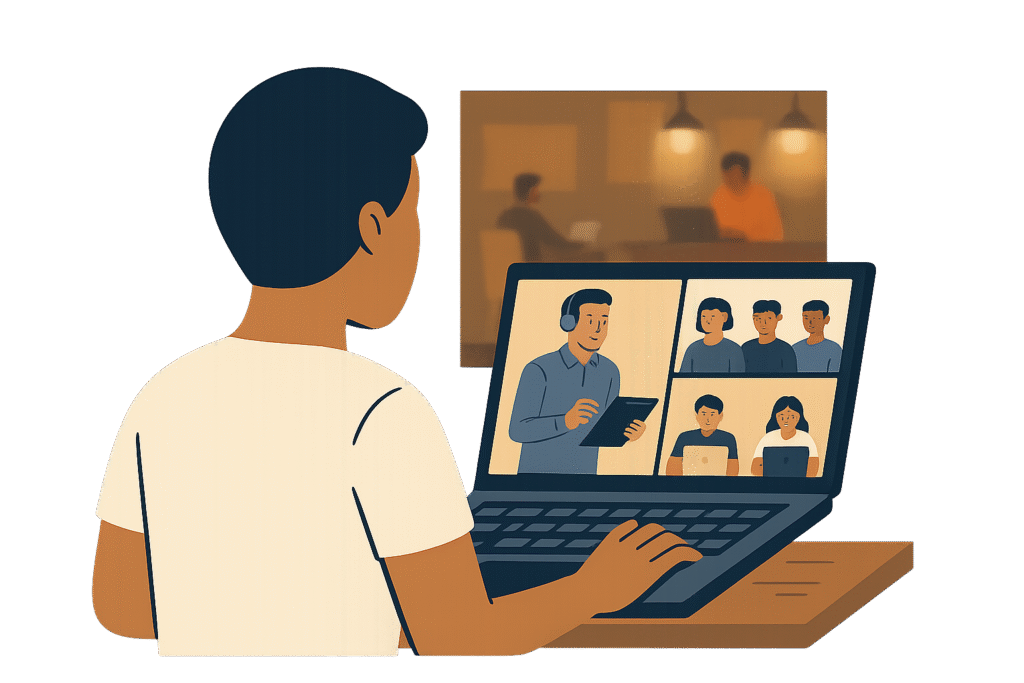
2. Online:
There are plenty of services, depending on what kind of accountability experience you’re after:
- Focusmate matches you with people who also want focused work sessions.
Good stuff: Free tier and instant scheduling at any point.
Limitations: Mutual partnership where people naturally prioritize their own goals over anyone else’s. And that’s understandable. - Flown and Caveday focus on group-based deep work sessions with a coach or facilitator.
Good stuff: Structured sessions with professional hosting.
Limitations: Group format makes it easy to keep a low profile. No one’s watching you specifically. - AccountaPartner provides one-on-one sessions with a dedicated accountability partner.
Good stuff: Fully focused on your goals. Your progress is their only metric.
Limitations: Not ideal for dabblers. It works best if your goals are ambitious enough to make the investment worthwhile.
Your cheat sheet: Friend vs. Pro
Still not sure which type of accountability partner is right for you? Ask yourself these three questions:
1. How serious are you about your goal?
- Just testing waters? A friend might do for now.
- Need real results? Go external. Friends rarely bring the consistency and pressure that lasting change demands.
2. Are you willing (or able) to pay?
- No budget? Try a motivated friend or a peer match online.
- Willing to invest? A paid partner often means a clearer return on your time and energy.
3. Do you want someone fully focused on your progress?
- Friends have their own goals and distractions. They won’t come prepared with notes to your session.
- Professional accountability partners show up ready, focused, and consistent.
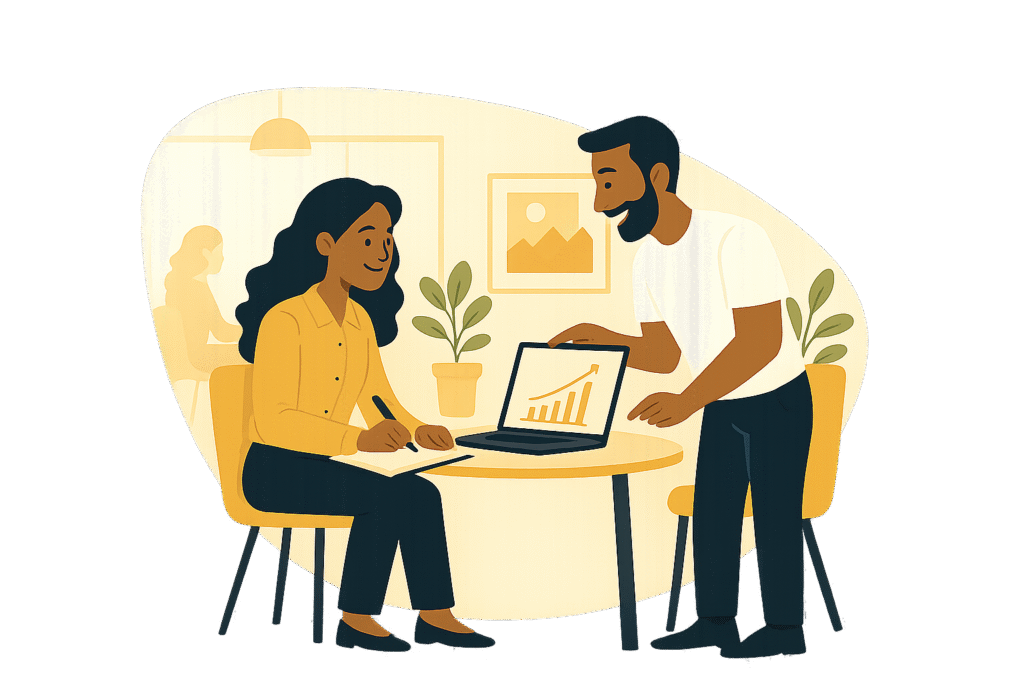
Final thoughts: Picking the right accountability partner means picking your outcome
Choosing an accountability partner is a bit like choosing a business co‑founder. Starting with a friend feels natural: you know their style, and there’s trust already baked in. But that same closeness can blur lines, soften feedback, or strain the relationship when expectations diverge. Hiring outside talent changes the dynamic. Roles are clear, structure is in place, but they require upfront investment and a bit of trial and error.
Not ready to commit fully to either? There’s a middle route: match with someone online and exchange the accountability role. It’s free, and if you both take it seriously, it can work well. The hidden price? It’s a bit of a roulette: expect a few no-shows before you find someone solid.
Whatever route you pick, remember the non‑negotiables of a strong accountability partner: reliability, earned respect, caring, candor, and meticulousness.
Whichever route you try, remember what makes a strong accountability partner: reliability, candid feedback, mutual respect, and follow-through you can count on. If you’re just getting started, partnering with a friend is far better than going solo. It also helps you figure out what kind of support actually works for you.
But when results truly matter, be ready to trade a little comfort for a lot more progress. Growth almost always lives on the edge of discomfort.
